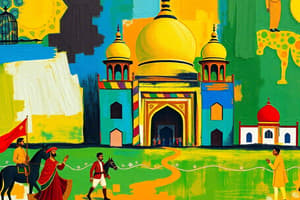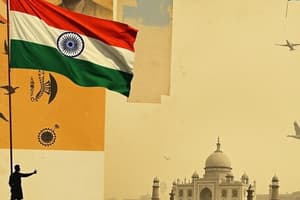Podcast
Questions and Answers
When did the British East India Company arrive in India?
When did the British East India Company arrive in India?
- 17th century
- 18th century (correct)
- 16th century
- 19th century
Which event led to the establishment of the British Raj in India?
Which event led to the establishment of the British Raj in India?
- Introduction of Western education
- Creation of Pakistan
- Commercial interests of the East India Company (correct)
- Rise of nationalist movements
Who were some of the key leaders in the Indian independence movement?
Who were some of the key leaders in the Indian independence movement?
- Jawaharlal Nehru, Subhas Chandra Bose, Sarojini Naidu (correct)
- Mahatma Gandhi, Abraham Lincoln, Vladimir Lenin
- Napoleon Bonaparte, Queen Victoria, Alexander the Great
- Julius Caesar, Genghis Khan, Cleopatra
What was the main goal of the Indian independence movement?
What was the main goal of the Indian independence movement?
When did India gain independence?
When did India gain independence?
In which year did India adopt its first Constitution?
In which year did India adopt its first Constitution?
What principles were enshrined in the Indian constitution drafted by the Constituent Assembly?
What principles were enshrined in the Indian constitution drafted by the Constituent Assembly?
Which Prime Minister of India focused on a 'socialist pattern of society' and implemented Five-Year Plans?
Which Prime Minister of India focused on a 'socialist pattern of society' and implemented Five-Year Plans?
In the 1990s, India underwent significant economic reforms known as:
In the 1990s, India underwent significant economic reforms known as:
Which group of nations is India a member of along with countries like Brazil, Russia, China, and South Africa?
Which group of nations is India a member of along with countries like Brazil, Russia, China, and South Africa?
Which country has India maintained close ties with on the world stage?
Which country has India maintained close ties with on the world stage?
What challenges has India faced despite undergoing significant economic reforms in the 1990s?
What challenges has India faced despite undergoing significant economic reforms in the 1990s?
Flashcards are hidden until you start studying
Study Notes
Unveiling Modern Indian History
In the tapestry of human civilization, India's trajectory over the past few centuries has been marked by significant events, fundamental changes, and bold movements. This journey towards modernity, encompassing the period from the 18th century to the present, is a complex and multifaceted narrative that adds fascinating layers to our understanding of India's past and present.
The British Era
The onset of modern Indian history can be traced back to the arrival of the British East India Company in the 18th century. The Company's commercial interests soon converted into political power, and by the mid-19th century, they had established the British Raj, which ruled India for almost 200 years. This period, characterized by the introduction of Western education, laws, and administrative systems, also saw the rise of nationalist movements that culminated in India's independence in 1947.
The Freedom Struggle
The Indian independence movement, fueled by the collective aspirations of a united India, was a significant aspect of modern Indian history. Leaders such as Mahatma Gandhi, Jawaharlal Nehru, Subhas Chandra Bose, and Sarojini Naidu played pivotal roles in shaping the movement's ideology and strategy. The goal of this struggle was to achieve self-rule, and it resulted in the partition of India and the creation of Pakistan in 1947.
The Indian Constitution
After independence, India adopted its first Constitution in 1950. The document, drafted by a Constituent Assembly, enshrined the principles of democracy, federalism, and secularism. This constitution has been amended several times and continues to serve as the foundational legal framework for India's governance.
Economic Development and Social Reform
In the decades following independence, India focused on economic development and social reform. Prime Minister Jawaharlal Nehru's vision of a "socialist pattern of society" led to policies such as the Five-Year Plans aimed at promoting industrialization, agricultural modernization, and improving social welfare. Despite these efforts, India's economy faced challenges, including poverty and inequality.
In the 1990s, India underwent significant economic reforms under the leadership of Prime Ministers Rajiv Gandhi, Manmohan Singh, and Narendra Modi. These reforms, known as economic liberalization, aimed to open up India's economy to foreign investment, reduce government regulation, and promote entrepreneurship. The results of these reforms have been mixed, with India experiencing economic growth but also facing ongoing challenges such as poverty, unemployment, and inequality.
India's Foreign Relations
India has played an active role on the world stage, engaging in diplomatic efforts, peacekeeping missions, and international organizations. The country has maintained close ties with the United States, Russia, and China, while also strengthening its relationship with neighboring countries such as Pakistan, Bangladesh, and Nepal. India is also a member of the United Nations, the G-20, and the BRICS group of nations.
Conclusion
Modern Indian history is a fascinating and complex narrative that covers a wide range of issues, events, and movements. From the British Raj and the Indian independence movement to economic development and social reform, India's modern history has been shaped by a diverse and dynamic array of factors. By examining this history, we can gain a deeper understanding of India's past, present, and future.
Studying That Suits You
Use AI to generate personalized quizzes and flashcards to suit your learning preferences.





